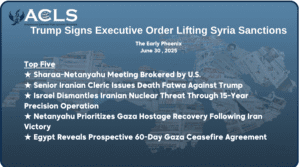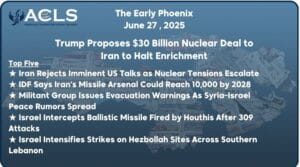By: Rania Kisar
No Ceasefire in Sight, Diplomatic Struggles, and Regional Tension Escalate.
U.S. Security Adviser’s Israel Visit Amidst Gaza Aid Concerns, Accelerated Arms Delivery, and Ceasefire Veto Fallout.
The U.S. National Security Adviser, Jake Sullivan, is set to visit Israel, focusing on increasing humanitarian aid to Gaza and discussing concerns over civilian casualties. This visit comes in the wake of several high-profile American officials’ engagements in the region, amidst heightened tensions with Hamas. Concurrently, the Biden administration, invoking emergency powers, expedited a $106.5 million deal supplying 14,000 tank shells to Israel, bypassing Congressional approval. This move, aimed at bolstering Israel’s defense, has drawn criticism from human rights groups, especially given the ongoing military activities in Gaza. Meanwhile, Palestinian President Mahmoud Abbas condemned the U.S. for vetoing a United Nations Security Council ceasefire resolution in Gaza, accusing America of facilitating genocide and war crimes by Israeli forces. This veto came despite widespread support for the resolution, further intensifying the geopolitical dynamics in the region. Israeli Prime Minister Benjamin Netanyahu warned President Biden of potential Israeli action against Yemen’s Houthis if the U.S. remains inactive. The Houthis, targeting Israeli interests, intensify regional tensions. Israel stresses military intervention unless Washington acts, following U.S. sanctions on Houthi financing over attacks and Iranian support.
Battles and Casualties Surge in Israel-Gaza War.
The escalating conflict in Israel and Gaza continues to take a heavy toll, with recent reports indicating significant military and civilian casualties on both sides. In a tragic development, Israel mourned the loss of five soldiers, including the nephew of a War Cabinet member, in recent clashes along the Gaza border and in Lebanon. The Israeli newspaper “Yedioth Ahronoth” disclosed that over 5,000 Israeli soldiers have been injured since the onset of the Gaza war, with more than 2,000 rendered “disabled.” This situation has posed unique challenges to Israel’s military and healthcare systems, particularly affecting young and female soldiers. In response to Hamas launching rockets from civilian areas in Gaza, including a site where a teddy bear was found rigged with ammunition, the IDF has intensified its operations. The Nahal Brigade and Yahalom special forces have been actively engaging Hamas fighters in areas like Jabalya. The situation has worsened following the US’s veto, leading to Israel escalating its airstrikes on southern Gaza. These intensified military actions have heightened civilian fears, with the UNRWA warning of a dire humanitarian crisis. Amidst these developments, Hamas continues to demand a prisoner exchange, even as the US advocates for the establishment of a Palestinian state after the war. Israeli forces have ramped up their activities in Khan Yunis, targeting over 250 Hamas sites, which has resulted in significant advancements including the discovery of tunnels and the seizure of weapons. The Al-Qassam Brigades, Hamas’ military wing, along with the Al-Quds Brigades of the Islamic Jihad Movement, have claimed the killing of eleven Israeli soldiers in Gaza. This claim comes amidst increasing tensions, as Hamas has rejected any prisoner release outside of negotiations, leading to more intense clashes and deadly Israeli airstrikes. The conflict saw further escalation with the Israeli army reporting the assassination of Hamas commander Imad Qareeqa and announcing the death of seven more soldiers in ongoing battles. These recent casualties add to a significant toll, with the Israeli army losing 430 soldiers since October. In a strategic shift, the Israeli military conducted its first aerial equipment drop in Gaza since 2006, supplying the 98th Brigade stationed in Khan Yunis with essential gear.
Gaza Crisis Deepens: Global Calls for Ceasefire Amid Health, Financial Strains.
As the conflict in Gaza intensifies, the death toll has reached a grim milestone. According to the latest figures, 18,000 people have lost their lives, with the Israeli military’s ground offensive contributing to 101 fatalities. The Gaza Health Ministry reports a significant number of Palestinian casualties, with 17,997 deaths and 49,229 injuries, underscoring the severe impact on both combatants and civilians.
The hostage situation in the region has drawn significant attention. Nili Margalit, a nurse who was recently freed from captivity in Gaza, shed light on the dire health conditions of elderly captives. Concerns about insufficient medical care, sanitation, and nutrition for those still held captive were brought to the Israeli war cabinet’s attention, calling for urgent action. Tensions in Gaza have intensified following Hamas’s insistence on negotiating a prisoner exchange as a condition for any prisoner release. This demand has led to heightened conflict, including severe clashes and a series of deadly Israeli airstrikes in the region on Monday.
In Israel, the financial repercussions of the prolonged conflict are becoming increasingly evident. The country faced a substantial budget deficit of 16.6 billion shekels (around $4.5 billion) in November, primarily attributed to costs associated with the conflict. This figure far exceeds the government’s targeted deficit of 0.9% of GDP, with projections indicating a potential rise to approximately 4% for the full year of 2023.
The World Health Organization‘s Director-General, Tedros Adhanom Ghebreyesus, has warned of severe health risks in Gaza due to the war. Overwhelmed medical facilities and dwindling resources raise concerns about disease outbreaks, underlining the urgent humanitarian situation.
The United Nations General Assembly is set to discuss a resolution calling for an immediate humanitarian ceasefire in Gaza. This follows the United States’ veto of a similar resolution in the Security Council, reflecting the General Assembly’s consistent stance on advocating for a cessation of hostilities on humanitarian grounds.
European Nations Call for Ceasefire; Spain, Ireland, Belgium, and Malta Lead the Charge. A group of EU nations, led by Spain, Ireland, Belgium, and Malta, is urging a joint European response to the Gaza crisis. They advocate for a permanent humanitarian ceasefire and propose an international peace conference. In a notable move, these nations recommend freezing assets of Israeli settlers implicated in violence against Palestinian communities to deter further escalation in the West Bank.
In a related move, France is contemplating sanctions against individuals involved in illegal settlement activities and related violence by Israeli settlers in the West Bank. This consideration marks a growing international response to the increasing tensions and broader implications of these activities.
Netanyahu Discusses Russian-Iranian Alliance with Putin.
Israeli Prime Minister Benjamin Netanyahu recently conveyed his concerns to President Vladimir Putin regarding the growing Russian-Iranian alliance during an extensive phone conversation. Netanyahu acknowledged Russia’s involvement in freeing a dual Israeli-Russian citizen and reaffirmed Israel’s commitment to utilizing all political and military avenues to secure the release of its abducted citizens. Concurrently, Russia has intensified its diplomatic involvement in the Gaza situation. Deputy Foreign Minister Mikhail Bogdanov, engaging with Hamas and other Palestinian factions, has advocated for the release of detainees in Gaza. This initiative is part of Russia’s larger engagement with Middle Eastern leaders, including Netanyahu.
Jordan Navigates Diplomatic Challenges in Israel-Hamas Conflict, Calls for U.S. Intervention.
Meanwhile, Jordan’s Foreign Minister has made serious allegations against Israel, accusing it of systematically evacuating Gaza in a manner he claims violates international law and could amount to war crimes. He has called on the United States to apply more pressure on Israel, emphasizing the broader repercussions of Israeli actions in the region and warning of potential escalation and further complexities. In the midst of the ongoing Israel-Hamas conflict, Jordan faces a challenging diplomatic scenario. The country is striving to balance its public condemnation of Israel with the need to maintain vital geopolitical relationships, including the 1994 peace treaty. Jordan’s recent diplomatic actions, such as recalling its ambassador and hesitating to sign a major treaty, reflect the intricacies of its position during the Israel-Hamas conflict. In a related development, Palestinian Prime Minister Mohammad Shtayyeh has urged international sanctions against Israel, accusing it of breaching international and humanitarian laws. Simultaneously, Jordan’s King Abdullah II has expressed concern over the escalating situation, particularly highlighting the threat posed by Israeli settler violence in the West Bank and the ongoing aggression in Gaza. These declarations coincide with heightened tensions, with Shtayyeh demanding accountability for Israel’s actions and Jordan emphasizing the critical need for a fair resolution to the Palestinian issue, advocating for a two-state solution.
Hezbollah Drone Attack Injures IDF Soldiers; Israel Retaliates with Airstrikes in Lebanon.
In the Western Galilee, six IDF soldiers were injured in a Hezbollah drone attack, prompting the IDF to launch airstrikes on Hezbollah sites in southern Lebanon, targeting rocket launch sites and military compounds. The IDF also thwarted an anti-tank missile attack near Zar’it. Israel’s national security adviser has sternly warned against Hezbollah’s presence along the northern border, indicating potential decisive action against ongoing threats, highlighting escalated regional tensions and Israel’s commitment to northern security.
===================



